

- JOURNAL WRITING IN PRE-K - Teachers.Net Gazette - MENTORING, STRESS RELIEF, STUDENT MOTIVATION, ORGANIZATION IDEAS, CLASSROOM MANAGEMENT, LESSON PLANS, DISCIPLINE, AND MORE - featuring columns and articles by top names in education and your teacher coll. Teacher Feature...
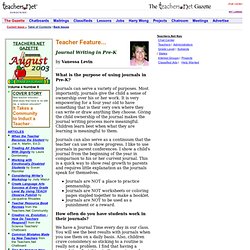
Journal Writing in Pre-K by Vanessa Levin What is the purpose of using journals in Pre-K? Journals can serve a variety of purposes. Most importantly, journals give the child a sense of ownership over his or her work. Journals can also serve as a continuum that the teacher can use to show progress. Journals are NOT a place to practice penmanship.Journals are NOT worksheets or coloring pages stapled together to make a booklet.Journals are NOT to be used as a punishment or a reward. Kindergarten. Pre-K: Writing Sample 1. Back to main page > Looking at Writing Context of writing A two year old girl produced this sample while working at the art table. After writing, she proudly held it up for approval. Writer. Phonemic Awareness. In Reading Recovery Writing in Reading Recovery includes procedures “designed to help a child to hear and think about the order of sounds in spoken words.
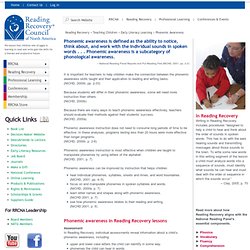
This has to do with the ears hearing sounds and transmitting messages about those sounds to the brain. To write some new words in this writing segment of the lesson a child must analyze words into a sequence of sounds, must identify what sounds he can hear and must deal with the order or sequence in which the sounds occur.” -- Clay, 2005, p. 70 Read more about how Reading Recovery aligns with the National Reading Panel's essential components. ► Phonics ► Vocabulary ► Fluency ► Comprehension Phonemic awareness is defined as the ability to notice, think about, and work with the individual sounds in spoken words . . . -- National Reading Panel Reports and Put Reading First (NICHD, 2001, pp. 2-3) Because students will differ in their phonemic awareness, some will need more instruction than others. Phonological Awareness.
Upon completion of this section, you will: Understand that phonemic awareness is an essential skill that underlies a student's ability to learn to read and spell Know the basics of phonemic awareness so that we may help dyslexics and parents understand.
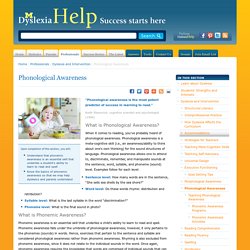
Phonemic Awareness. Phonological Awareness Lessons. Irvine Unified School District: Phonemic Awareness Activities for 4-5-6 Year Olds. FAMILY LITERACY PROJECT Phonemic Awareness Activities for 4-5-6 Year Olds Research has shown repeatedly that phonemic awareness is a powerful predictor of success in learning to read.
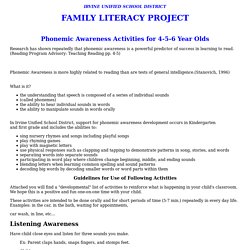
(Reading Program Advisory: Teaching Reading pp. 4-5)Phonemic Awareness is more highly related to reading than are tests of general intelligence. (Stanovich, 1996)What is it? Ex: Parent claps hands, snaps fingers, and stomps feet. Child opens eyes. Parent says, "First you heard ______. Continue listening game using the following: Syllable, Beginning Sounds and Rhyming Words. Phonemic Awareness: Books. Phonological Awareness. Phonemic Awareness Information and Activities. What is phonological awareness?
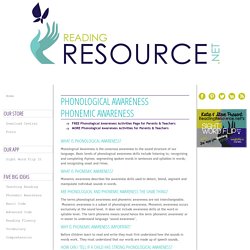
Phonological Awareness is the conscious awareness to the sound structure of our language. Mrs Jump's class. KinderGals. Kathy Griffin's Teaching Strategies. Childcareland.com - Home. Emergent Readers - Google Docs. Computer Lab Favorites. Sign in -or- Register Computer Lab Favorites Site Map Use these interactive, self-contained activities to introduce a topic or enliven your lab time.
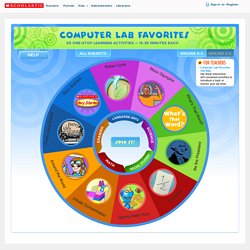
PRIVACY POLICY · Terms of Use · TM ® & © 2016 Scholastic Inc. All Rights Reserved. Alphabet BINGO - An activity for children to learn the alphabet. ABCya is the leader in free educational computer games and mobile apps for kids.
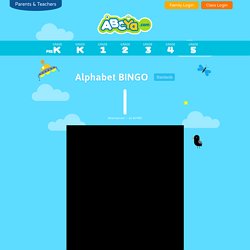
The innovation of a grade school teacher, ABCya is an award-winning destination for elementary students that offers hundreds of fun, engaging learning activities. Millions of kids, parents, and teachers visit ABCya.com each month, playing over 1 billion games last year. Apple, The New York Times, USA Today, Parents Magazine and Scholastic, to name just a few, have featured ABCya’s popular educational games. ABCya’s award-winning Preschool computer games and apps are conceived and realized under the direction of a certified technology education teacher, and have been trusted by parents and teachers for ten years.
Our educational games are easy to use and classroom friendly, with a focus on the alphabet, numbers, shapes, storybooks, art, music, holidays and much more! KS1 Bitesize - Literacy. Student Materials: Word Family Sort. Student Materials: Picture Match. RhymingRockets. ABC Songs for Children - 13 Alphabet Songs & 26 Videos. 3D Alphabet Bus Songs For Children. Alphabet Letter People. When children first start learning the forms and names of letters it's important for them to look at the details that make up each letter.
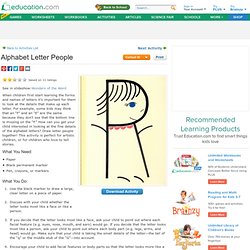
For example, some kids may think that an “F” and an “E” are the same because they don't see that the bottom line is missing on the “F.” How can you get your child interested in looking at the fine details of the alphabet letters? Draw letter people together! Lesson Plan: Phonemic Awareness, Say it and Move It. Most people have never heard of a part of the reading process called Phonemic Awareness.
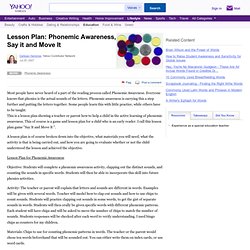
Everyone knows that phonics is the actual sounds of the letters. Phonemic awareness is carrying this a step further and putting the letters together. Some people learn this with little practice, while others have to be taught. Activities to Promote Phonemic Awareness. Phonemic awareness, the ability to break a word into the smallest units of sound, is essential to learning how to read.
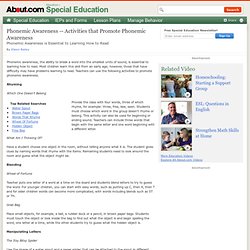
Most children learn this skill from an early age; however, those that have difficulty may have problems learning to read. Teachers can use the following activities to promote phonemic awareness. Rhyming Which One Doesn't Belong Provide the class with four words, three of which rhyme, for example: three, free, bee, seen. Small ideas. ReadWriteThink: Student Materials: Picture Match. Phonemic Activities for the Preschool or Elementary Classroom. This article features activities designed to stimulate the development of phonemic awareness in preschool and elementary school children. The activities originally appeared in the book Phonemic Awareness in Young Children: A Classroom Curriculum. Listening to sequences of sounds From chapter 3: Listening games Objective To develop the memory and attentional abilities for thinking about sequences of sounds and the language for discussing them.
Starfall: Learn to Read with Phonics, Learn Mathematics. Parent Handouts- Phonemic Awareness, Sight Words, Oral Reading Fluency and Reading Comprehension - Make Take & Teach. So it’s almost mid-year conference time. Parents often ask for ideas for helping their child at home. Here are few handouts that can come in handy. I’ve developed handouts for each area of literacy. Each handout briefly explains the area of literacy and then ideas helping their child develop those skills are provided. Between the Lions . Fuzzy Lion Ears. Come play again later! Rhyming Dictionary. Easy to read on your phone. Chicken Coop. Study Stack.
Instant Crossword Puzzle Maker. Spelling Learning Games For Kids. When we first start school, we learn letters and the sounds that letters make. (Although many kids learn these even before they start school!) We soon learn that some of these letters are called consonants and some of them are called vowels. Short vowels show up a lot, so it’s important for children to have a good understanding of what they are and what they do. Many teachers will give students other words that have the short vowel sounds and pictures that will help them remember. You might remember this: a as in apple, e as in elephant, i as in igloo, o as in octopus, u as in umbrella. Learning phonics takes practice. Next 200 High Frequency Words. Alphabet Recognition Pages.
Phonemic Awareness Skill Games . PBS KIDS Raising Readers. Phonemic Awareness - Interactive Sites for Smartboard Use – Grades K - 5 - Oak Street Elementary School - Plattsburgh City School District. 5 Quick, Easy, and Fun Phonemic Awareness Activities. Learning to read can be quite an overwhelming task for small children. In fact, if you think about it, it’s astounding that children are even capable of learning to read in such a short amount of time. However, before they begin to read print, they must have an adequate foundational understanding of how sounds in words work. Phonemic Activities for the Preschool or Elementary Classroom. Teaching Rhyme through Songs: Foundations for Phonemic Awareness. Phonemic Awareness Activities. A Fun Halloween Phonemic Awareness Activity.
Two kids away at college and the other at a birthday party. Patti's Activities. The Task. FREE Phonemic Awareness Games. The Same-Different Game. One of the four signs your child is ready to read is something called “phonological awareness”.